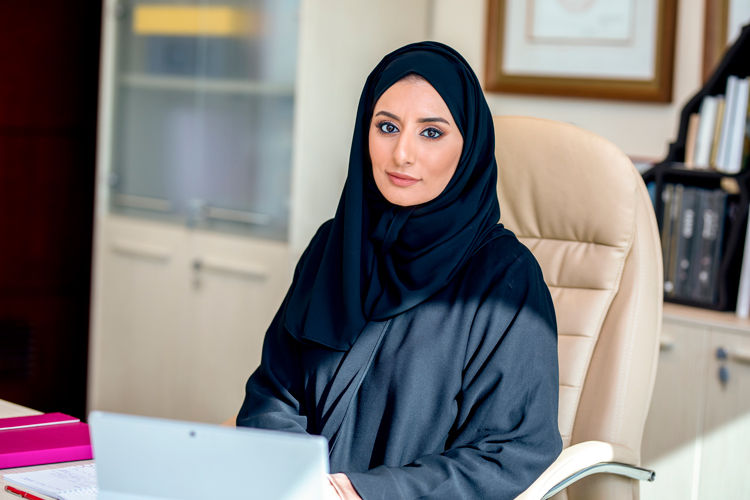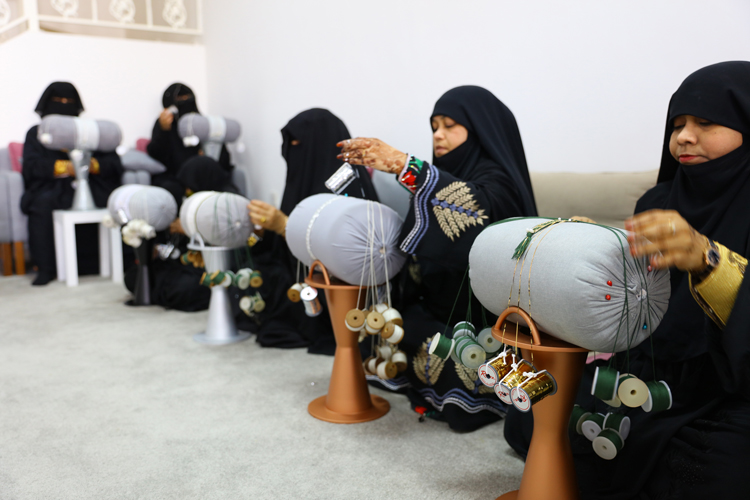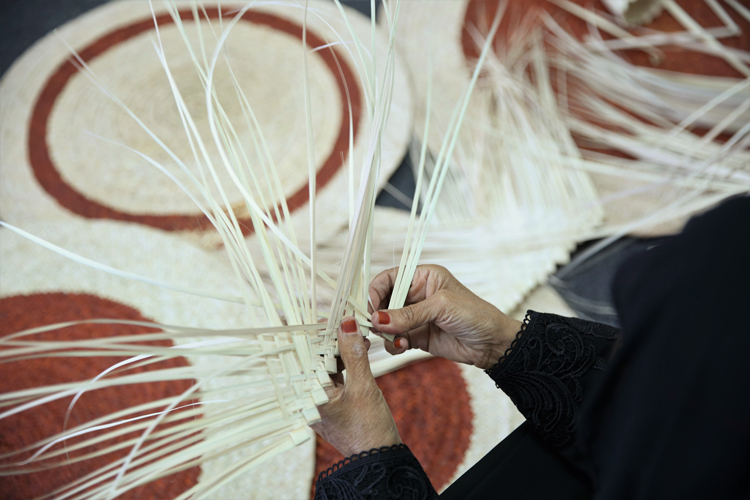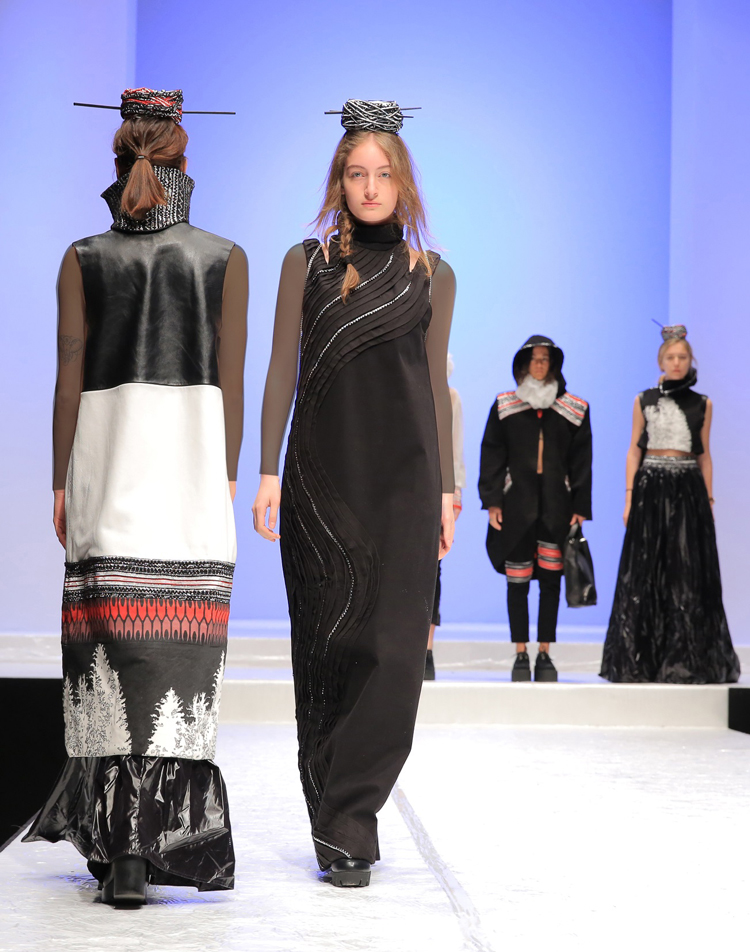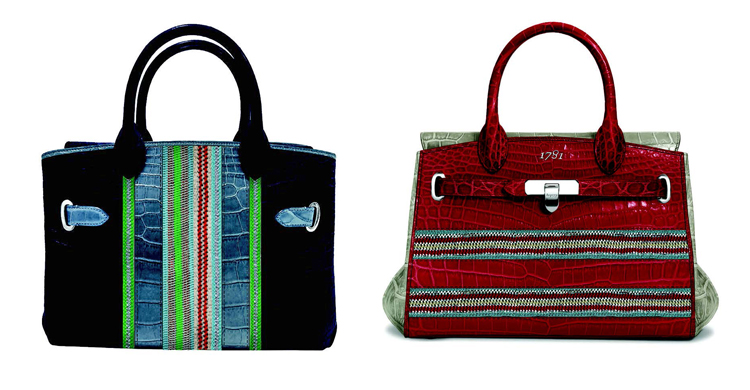Reem Binkaram, director of Nama Women Advancement Establishment explains how local women are being empowered through the preservation of traditional Emirati crafts.
In a small coastal fishing town in Sharjah you’ll find Dibba Al Hisn, the setting of an ambitious project to revive and redefine Emirati craft and heritage. This project; the Bidwa Social Development Programme, was launched in 2016 by the Irthi Contemporary Crafts Council and it aims to bring together local women who are creating traditional crafts. The project is an affiliate of NAMA Women Advancement Establishment (NAMA) and was launched under the patronage of Her Highness Sheikha Jawaher bint Mohammed Al Qasimi, wife of His Highness the Ruler of Sharjah, Chairperson of NAMA.
So far the Bidwa Programme has brought together over sixty female artisans who create traditional Emirati crafts known as “Talli” as well as “safeefah”, a form of weaving with dried palm leaves, and “sadu”, a form of loom weaving. In the process, they are learning how to incorporate new technologies and practices into their craft, reinterpreting their skills for the modern markets, and creating a tight-knit female artisan community in the UAE who have a stake in each other’s professional and social development. The programme is giving a purpose to women (often retired or older) who otherwise wouldn’t have a job or hobby to invest their time in. Many of the women have been creating these crafts for decades within their communities but this is the first time they have been recognised on an international scale.
So far the project has had recognition from luxury handbag brand Asprey, who collaborated with Bidwa on a range of handbags that were sold worldwide. The collection which was named “One Stitch at a Time” was sold at an exclusive pop-up Asprey store in London. The centre has also created Talli designs for Emirati-inspired catwalk looks for the Accademia Italiana at the Alta Roma fashion week, as well as a partnership with All Things Mochi. The plan is to take things further with hope of attracting more international brands to adopt these techniques.
The Council aims to provide a fresh narrative for women in the region through the crafts by developing new market opportunities, delivering social development programmes and vocational training, as well as preserving the skills and rich cultural heritage of the UAE for current and future generations. To find out more we talked to Reem BinKaram, Director of NAMA Women Advancement Establishment who shed light on why this programme is so important to the women involved.
How is the Bidwa Social Development Programme empowering women?
At Irthi, the first and most essential step for us was to recognise the true value of traditional local crafts, the handiwork put in by their creators, and share that value with the rest of the world. The Bidwa Social Development Programme has been achieving this goal and empowering women by bringing traditional Emirati crafts produced by local craftswomen to regional and international audiences.
Turning the craft into an occupation has secured a sustainable source of income for these women, and has enabled their professional and social empowerment, paving the way for the next generation of locally-based artisans.
It offers female artisans the chance to not only master their skills but add to them through Bidwa’s vocational training courses in both soft skills and technical craft skills. We are always on the lookout for possible collaborations with local and international design houses and fashion labels, in our pursuit to open new market opportunities for these talented artisans. We will expand to include new training centres in various locations across the emirate in the near future.
Can you tell us about the women who are part of the Bidwa Programme?
The women are Emirati mothers and grandmothers in the 22 – 65+ age group, of various artisanal skills and expertise. More than sixty women have joined our training centre in Dibba Al Hisn since the programme’s inception. They come from various backgrounds, some from the city of Dibba as well the surrounding area. We work with all women who show interest and dedication to begin their journey in the crafts sector and aspire to apply their skills professionally.
The centre offers free vocational courses in the Emirati crafts of Talli (hand-woven braids) and Safeefah (palm-frond weaving). Our most recent course was launched in April 2018 in couture embroidery, as part of an artisan skills exchange programme with Pakistan.
Why do you think it’s important for these women to be part of the Bidwa Programme? How do you think it motivates them?
Women join the Bidwa programme looking to learn a new skill, or to develop the skills they already have. What we often notice is that they stay with us longer than they expected. They end up forming strong-knit friendships and a community bond with the other women.
As far as skill development goes, most women who join us show incredible progress in their skills in the very first few weeks, which is a great source of motivation for them, and encourages them to continue their work and aim to reach the next higher level. Most of our artisans arrive knowing a few basic types of Emirati crafts and end up learning several more, eventually mentoring new joiners.
The Council’s focus on design intervention to provide a fresh narrative to the crafts has rubbed off on the artisans themselves who are very keen to work with our product designers to try their hand at pattern enhancements; some of which never been attempted in traditional practice. They have developed a proud sense of professionalism and are committed to present work in a way that meets the highest standards. We are proud of each one of them.
As a result, the Bidwa programme has created over fifty exclusive craft designs that were developed by our designers in collaboration with the artisans themselves, and we are in the process of registering them formally.
Why do you think it is important to preserve the traditional crafts of the region?
Traditional crafts are a celebration of love for one’s country, its traditions and heritage. They offer a window into the soul of the civilisations they are born out of – a centrepiece of a nation’s cultural heritage. Traditional crafts are a national treasure, which help us distinguish one culture from another and understand the values our forefathers lived by. Crafts give people a collective identity and strengthen that feeling of belonging to a place that we humans are so attached to.
Traditional crafts are the legacy of past generations that must be passed down from one generation to the next. Our crafts make us unique; they anchor our aspirations for the future and give us creative wings to build on the legacy our ancestors have worked so hard to create and sustain.
Some of the work has been recognised by international brands – what can you tell us about this?
Over the past three years, Bidwa has taken traditional Emirati crafts to a global level, through pioneering partnerships and showcasing opportunities with international labels. In November 2018, the ‘Crafts Dialogue’ project was launched by Irthi in collaboration with Barcelona-based ‘Creative Dialogue’ to create four capsule collections will combine the Emirati crafts of Talli and Safeefah created by the female artisans of the Bidwa programme, and clay, with Italian Murano glass, and Spanish leather by Emirati, Spanish, and Italian designers.
In April 2018, All Things Mochi launched an exclusive Ramadan women’s collection boasting over 600 metres of colourful ‘Talli’ embroidery, delicately crafted by 36 female artisans from the Bidwa Programme. His Royal Highness Prince Charles, Prince of Wales also met with women from the Bidwa Programme and attended a demonstration of the ‘Talli’ by the artisans.
In July 2016, a limited-edition range of handbags by iconic British luxury goods house Asprey London featured ‘Talli’ in bespoke designs and striking colourways. The products took 23 women nearly three months to braid by hand. The proceeds of the collection went entirely to support the Bidwa Programme to empower Emirati craftswomen. And finally Irthi collaborated with renowned fashion academy, Accademia Italiana, where Emirati-inspired fashion took to the runway during the Alta Roma fashion week in Rome with collections featuring traditional ‘Talli’ braids created by the Bidwa artisans.
Can you explain some of the traditional Emirati crafts – the Talli for example?
Talli is a type of handwoven braid created using a technique similar to bobbin lace. Traditionally, Emirati women created Talli in the home and used it to decorate the hems, cuffs and collars of clothing. Making a one-metre strand of Talli could take up a few hours, and go up to a few weeks or even months, depending on the complexity of the design. It is created by weaving together cotton and metallic threads (‘khosa’) on beautifully-decorated pillows, which are placed on a metal stand known as a ‘kajooja’. Traditionally, Talli designs were inspired by nature – animals, flora and fauna native to the region. Irthi Contemporary Crafts Council has developed and reinterpreted this into over 40 different styles of Talli. Our designers work with the artisans at Bidwa to introduce new designs, sometimes merging two or more patterns together to form uniquely intricate designs. Colour palettes and patterns can be created on a bespoke made-to-order basis or purchased from our seasonal collection.
What do you want the world to know about the work the council is doing?
As a social development programme, Bidwa works on three main pillars: social, economic, and environmental. On the social aspect, we focus on improving quality of life, learning, community development, and ensuring equal opportunities and ethical practice. From the economic aspect, we focus on artisan’s rights and sustainable incomes that reflect the true value of their work. Finally, in the environment aspect we focus on using and encouraging sustainable resources, and an environmentally-friendly approach. Irthi Contemporary Crafts Council recognises women as true designers, artists and craftspeople.
Part of the challenge is that many crafts such as Talli take a long time to be produced due to their complexity. Recognising this dynamic, Irthi’s strategy is to reimagine and elevate these crafts by introducing them to new markets with a fresh narrative, where the true value of the work can shine. To this end, we partner with design houses, fashion labels and sister organisations worldwide to showcase the work of our artisans through contemporary products, which will offer their craft the desirable relevance and sustainability.
How do you think these crafts are still relevant in today’s culture?
One of Irthi’s essential roles is to preserve traditional crafts by providing a fresh narrative that keeps them relevant to today’s culture and fast-paced developments. Crafts, although they reflect our heritage and traditions, have immense potential in today’s world precisely because of the intrinsic value and meanings they carry. At Irthi, we do not believe in only placing crafts behind museum displays. We think that crafts can be worn, accessorised, draped, displayed, used in décor and furniture, and can be used in as many ways as one’s imagination allows them to. This is why these crafts are ageless and will remain forever relevant.
How do you think they complement luxury fashion products?
Fashion labels globally are becoming increasingly attracted towards fusing the old and new to create unique aesthetics that appeal to the discerning buyer. The inevitable variance and deviation found in handmade traditional crafts have played a major role in their growing popularity in luxury fashion, which in recent years, has headed towards more personalised and experimental elements. For instance, no two pieces of Talli can ever look the same. The same Talli pattern can come out completely differently depending on the artisan who works on it, the pressure applied, and many other factors that can have a great impact on the pattern’s shape, width and length. Traditional crafts complement luxury fashion products by bringing them deeper meanings and values from cultures around the world.
What would you like to achieve with the Irthi Contemporary Crafts Council?
The Council’s vision is to build a valued artisan economy in the emirate of Sharjah, the UAE, and the wider Middle East, North Africa, South East and Central Asia regions. For us, women’s advancement and empowerment, and the elevation and preservation of the cultural heritage of the UAE’s traditional crafts are achieved conjointly.
Future plans include developing our own range of luxury fashion accessories and homeware products in collaboration with Emirati and international designers and labels, and providing a high-level platform and source of revenue for craftspeople across the region.
The council has already launched its first artisan exchange programme with Pakistani artisans earlier in 2018, where 16 artisans trained by renowned fashion designer Rizwan Beyg, worked with Emirati craftswomen to teach them the basics of couture embroidery at the Bidwa Centre in Dibba Al Hisn. We are also keen on launching new phases of the skills exchange programme with artisan communities from various countries.
How do you think we can work to teach the next generations about the crafts?
In today’s fast-changing world with developing technologies, life has taken an especially quick pace for new generations. In light of these developments, teaching children and youths about age-old crafts can pose several challenges. That is why at Irthi, we are always innovating to bring this vital age group into the folds of the understanding and appreciation of our traditional crafts.
We launched an exclusive programme dedicated to children and youth titled ‘Hirfati’ [my craft], and carrying the slogan ‘My Craft, My Future,’ with the specific mission to protect the heritage crafts of the United Arab Emirates by preserving them for current and future generations.
The programme engages with children as young as seven by using meaningful connections to their past, and offering a mix of workshops, activities, and competitions that combine traditional and modern crafts.


